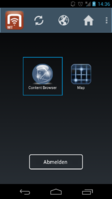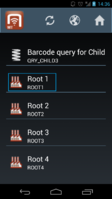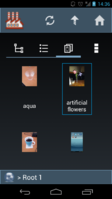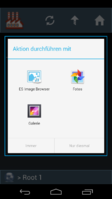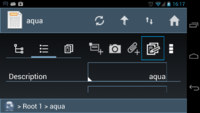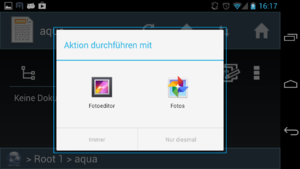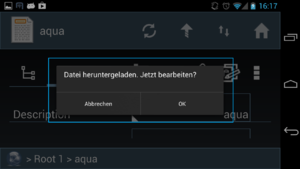m (→Creating Documents) |
|||
| (20 intermediate revisions by 3 users not shown) | |||
| Line 39: | Line 39: | ||
Find detailed information how to create a new document on the client [[HowTo:Create_a_new_Document_(UBIK_Android)|here]]. | Find detailed information how to create a new document on the client [[HowTo:Create_a_new_Document_(UBIK_Android)|here]]. | ||
| + | |||
| + | {{Attention|File extensions are case-sensitive depending on the OS. On iOS and Android, file systems are case-sensitive, while on Windows, file systems are case-insensitive.}} | ||
=== Taking a Picture === | === Taking a Picture === | ||
| Line 55: | Line 57: | ||
Depending on the connectivity mode, the next synchronization run will bring the new content and file to the server. | Depending on the connectivity mode, the next synchronization run will bring the new content and file to the server. | ||
| − | == | + | [[Category:Android|Documents (UBIK Android)]] |
| + | [[Category:Client|Documents (Client)]] | ||
| + | [[Category:Document|Documents (UBIK Android)]] | ||
| + | [[Category:Mobile|Documents (Client)]] | ||
| + | [[Category:WinX|Documents (Client)]] | ||
| + | |||
| + | == Modify Documents == | ||
For editing, [[HowTo:Make_a_Document_ready_for_Redlining|Redlining]] and actually changing [[ManagedDocuments]] (where changing is allowed) is possible. | For editing, [[HowTo:Make_a_Document_ready_for_Redlining|Redlining]] and actually changing [[ManagedDocuments]] (where changing is allowed) is possible. | ||
| Line 96: | Line 104: | ||
After the download was finished, the user is asked if (s)he wants to edit the document now. | After the download was finished, the user is asked if (s)he wants to edit the document now. | ||
If so, the editing proceeds as described for an already downloaded file. | If so, the editing proceeds as described for an already downloaded file. | ||
| + | |||
| + | {{Clear}} | ||
| + | |||
| + | == PDF Documents == | ||
| + | |||
| + | === PDF Renderers {{Version/WinXSince|4.6.0}} === | ||
| + | The Syncfusion PDF control embedded in the WinX client can use two different renderers to render and display PDF documents. | ||
| + | * The standard Syncfusion renderer which uses [https://learn.microsoft.com/en-us/uwp/api/windows.data.pdf?view=winrt-26100 Windows.Data.PDF] | ||
| + | * [https://pdfium.googlesource.com/pdfium/ PDFium] | ||
| + | There can be issues for each renderer when dealing with certain documents. If that's the case, you can try changing the [[Settings#Content|PdfRenderer setting]] in the WinX client and see if the issue still persists. | ||
| + | |||
| + | {{Hint|Generally speaking, the PDFium renderer seems to be more performant in the majority cases. That's why it is the default option.}} | ||
| + | |||
| + | ==== Syncfusion ==== | ||
| + | When using this renderer, we have experienced an issue with certain PDF diagrams where certain texts change when you zoom in on the documents. Unfortunately, we are unaware of the reason of this issue and could not find public documentation on similar problems. | ||
| + | |||
| + | ==== PDFium ==== | ||
| + | * This renderer currently does not support digital signatures (e.g. created by [https://www.docusign.com Docusign]) unless they are flattened into the PDF documents. | ||
| + | * With this renderer selected, some documents in the Flip View might appear blank when zooming. | ||
| + | |||
| + | |||
| + | |||
=== PDF Text Search === | === PDF Text Search === | ||
It is possible to search and highlight arbitrary texts in the UBIK PDF viewer. By clicking the magnifier button, an input field opens to search for specific text entries in the document. The results will be highlighted in the PDF file. By clicking the arrow buttons, it is possible to switch to the next and previous results. {{Version/XamarinSince|4.3.0}} | It is possible to search and highlight arbitrary texts in the UBIK PDF viewer. By clicking the magnifier button, an input field opens to search for specific text entries in the document. The results will be highlighted in the PDF file. By clicking the arrow buttons, it is possible to switch to the next and previous results. {{Version/XamarinSince|4.3.0}} | ||
| + | |||
==== Automatic Text Search {{Version/XamarinSince|4.4.0}}{{Version/WinXSince|4.4.0}} ==== | ==== Automatic Text Search {{Version/XamarinSince|4.4.0}}{{Version/WinXSince|4.4.0}} ==== | ||
Using the [[SYSCLS_DOCUMENT_HIGHLIGHTING_CLASSIFICATION|Document Highlighting Classification]] A PDF document can search for a defined search term from its parents properties automatically as soon as it is being navigated to. | Using the [[SYSCLS_DOCUMENT_HIGHLIGHTING_CLASSIFICATION|Document Highlighting Classification]] A PDF document can search for a defined search term from its parents properties automatically as soon as it is being navigated to. | ||
| + | |||
| + | === Remember Document Settings {{Version/WinXSince|4.9}} === | ||
| + | By default, PDFViewer settings are not saved and always reset when reloading a document. The Remember Document Settings feature enables the automatic saving & preserving of the Zoom level, Annotation color, and Stroke width value within a {{UBIK}} session. | ||
| + | It can be configured in the [[Settings#Content|Settings]]. | ||
| + | With this feature enabled, the PDFViewers Annotation color, Zoom level, and Stroke width value set by the user will be saved and preserved until the user changes them again. | ||
| + | |||
| + | If a document is configured with the [[SYSCLS_AUTO_ZOOM_CLASSIFICATION|Auto Zoom classification]], it will be overruled by the user's value as soon as the user sets it. | ||
| + | If an [[XAML#UBIKPdfViewer|AnnotationDefaultStrokeWidth]] value is configured, it will be overridden by the user's value as soon as the user sets it. | ||
| + | |||
| + | {{Attention|Saving the Zoom value with touch gestures is not supported. But the SaveZoomSettingsCommand can be used to save the Zoom value manually.}} | ||
| + | |||
| + | The SaveZoomSettingsCommand can be applied to a button as follows: | ||
| + | <source lang = "xml"> | ||
| + | <pdfViewer:SfPdfViewerControl | ||
| + | Name="pdfViewer" | ||
| + | ... /> | ||
| + | <Button | ||
| + | Content="Save Zoom" | ||
| + | Command="{Binding ElementName=PdfViewer, Path=SaveZoomSettingsCommand}" /> | ||
| + | </source> | ||
| + | |||
| + | |||
| + | |||
== See also == | == See also == | ||
* [[HowTo:Create_a_new_Document_(UBIK_Android)]] | * [[HowTo:Create_a_new_Document_(UBIK_Android)]] | ||
* [[HowTo:Make_a_Document_ready_for_Redlining]] | * [[HowTo:Make_a_Document_ready_for_Redlining]] | ||
| + | * [[SYSCLS_DOCUMENT]] (Classification) | ||
* [[SYSCLS_FILEDOCUMENT]] (Classification) | * [[SYSCLS_FILEDOCUMENT]] (Classification) | ||
* [[SYSCLS_EDITABLEDOCUMENT]] (Classification) | * [[SYSCLS_EDITABLEDOCUMENT]] (Classification) | ||
* [[SYSCLS_REDLINEDFILE]] (Classification) | * [[SYSCLS_REDLINEDFILE]] (Classification) | ||
* [[SYSCLS_DOCUMENT_HIGHLIGHTING_CLASSIFICATION]] (Classification) | * [[SYSCLS_DOCUMENT_HIGHLIGHTING_CLASSIFICATION]] (Classification) | ||
| + | * [[SYSCLS_URLDOCUMENT]] (Classification) | ||
| + | * [[SYSCLS_THUMBNAILEDDOCUMENT]] (Classification) | ||
| + | * [[SYSCLS_TEXTDOCUMENT]] (Classification) | ||
| + | * [[SYSCLS_OFFLINE_AVAILABLE_DOCUMENT]] (Classification) | ||
[[Category:Android|Documents (UBIK Android)]] | [[Category:Android|Documents (UBIK Android)]] | ||
[[Category:Document|Documents (UBIK Android)]] | [[Category:Document|Documents (UBIK Android)]] | ||
| + | [[Category:Mobile|Documents (Client)]] | ||
| + | [[Category:WinX|Documents (Client)]] | ||
| + | [[Category:Client|Documents (Client)]] | ||
Latest revision as of 08:10, 23 October 2025
Documents are UBIK® objects referencing a file, e.g. a PDF document. Like other UBIK® objects, they can be synchronized to the UBIK® Client. The Android client provides various features related to documents.
Document Types
- Managed Document - Documents with a locally managed file.
- Linked Document - Documents with a file linked by an URL, not locally managed by UBIK®.
Viewing Documents
Viewing the File
Documents can be viewed using the Content Browser. For every object, three content tabs are shown: "Children", "Properties" and "Documents". The latter contains a thumbnail grid view for all document-type children of the current object.
A click on such a thumbnail shows the document if it was already downloaded, otherwise the document will be downloaded from the server and a dialog for showing it will be shown on success.
3rd party applications are used to show documents. Therefore, if no viewer for a certain file type (e.g. PDF) is installed, an error message will be shown.
Viewing the Object Data
Not only the file, but also the UBIK® property values of a document object can be viewed. To do so, the thumbnail has to be long-clicked. Then, the property list view for the respective object will be opened, allowing the user to change values (if it was configured on the server).
Creating Documents
Depending on the configuration of the UBIK® data model and the ACM, documents can be created as children for existing objects. A context menu entry appears in the Content Browser for creating objects if this is configured.
Find detailed information how to create a new document on the client here.
| File extensions are case-sensitive depending on the OS. On iOS and Android, file systems are case-sensitive, while on Windows, file systems are case-insensitive. |
Taking a Picture
In certain cases, the camera can be used to take a picture and create a document for it - in this case, another "Take Picture" context menu entry is available.
Editing and Submitting the newly created Document
After either a document was chosen or a picture was taken, the newly created object is opened in a property view, allowing the user to abort the creation or to enter specific property values (e.g. for the description of the object) and finally save the object.
uploaded Document objects can potentially contain detailed Information concerning the original file (e.g. file name, path)
Synchronization
Depending on the connectivity mode, the next synchronization run will bring the new content and file to the server.
Modify Documents
For editing, Redlining and actually changing ManagedDocuments (where changing is allowed) is possible.
Redlining
Redlining is the process of creating a new, adapted version of an existing document. This can be achieved on the UBIK® Android client, if it has been configured correctly in the UBIK® data model and ACM. A respective context menu button will be available in the Content Browser for a document object in this case.
For redlining, a copy of the document will be created and opened for editing in any installed 3rd party application that can handle the "intent". When the user accepts the change, the creation of a new document object classified as a redlined document will be triggered (as described in "Creating Documents in UBIK® Android").
The previous redlining number indicators are replaced by the child document indicators.
Editing Documents
In order to edit a document managed by UBIK®, one has to access the Document object by long-clicking its thumbnail in the documents-tab of its parent object's Content Browser. Then, the Content Browser for the Document object provides an "Edit File" action item in the context aware action bar.
Editing an already downloaded file
If the file was already downloaded, the user is asked to choose any installed 3rd party application for editing the respective file. In case no such app is installed, editing the document is not possible.
| The 3rd party app used for editing the file must be able to return the resulting file (in contrast to store it on the file system without telling UBIK®)! A recommended app fitting this requirement is the [Photo Editor by Aviary]. |
When the editing was finished, the new file is marked as changed and will be committed automatically if Automatic Sync mode is active, else the user can commit manually.
Editing a not yet downloaded file
When a file wasn't downloaded yet but editing was chosen nontheless, the UBIK® Android client will automatically download the file. After the download was finished, the user is asked if (s)he wants to edit the document now. If so, the editing proceeds as described for an already downloaded file.
PDF Documents
PDF Renderers
The Syncfusion PDF control embedded in the WinX client can use two different renderers to render and display PDF documents.
- The standard Syncfusion renderer which uses Windows.Data.PDF
- PDFium
There can be issues for each renderer when dealing with certain documents. If that's the case, you can try changing the PdfRenderer setting in the WinX client and see if the issue still persists.
| Generally speaking, the PDFium renderer seems to be more performant in the majority cases. That's why it is the default option. |
Syncfusion
When using this renderer, we have experienced an issue with certain PDF diagrams where certain texts change when you zoom in on the documents. Unfortunately, we are unaware of the reason of this issue and could not find public documentation on similar problems.
PDFium
- This renderer currently does not support digital signatures (e.g. created by Docusign) unless they are flattened into the PDF documents.
- With this renderer selected, some documents in the Flip View might appear blank when zooming.
PDF Text Search
It is possible to search and highlight arbitrary texts in the UBIK PDF viewer. By clicking the magnifier button, an input field opens to search for specific text entries in the document. The results will be highlighted in the PDF file. By clicking the arrow buttons, it is possible to switch to the next and previous results.
Automatic Text Search
Using the Document Highlighting Classification A PDF document can search for a defined search term from its parents properties automatically as soon as it is being navigated to.
Remember Document Settings
By default, PDFViewer settings are not saved and always reset when reloading a document. The Remember Document Settings feature enables the automatic saving & preserving of the Zoom level, Annotation color, and Stroke width value within a UBIK® session. It can be configured in the Settings. With this feature enabled, the PDFViewers Annotation color, Zoom level, and Stroke width value set by the user will be saved and preserved until the user changes them again.
If a document is configured with the Auto Zoom classification, it will be overruled by the user's value as soon as the user sets it. If an AnnotationDefaultStrokeWidth value is configured, it will be overridden by the user's value as soon as the user sets it.
| Saving the Zoom value with touch gestures is not supported. But the SaveZoomSettingsCommand can be used to save the Zoom value manually. |
The SaveZoomSettingsCommand can be applied to a button as follows:
Name="pdfViewer"
... />
<Button
Content="Save Zoom"
Command="{Binding ElementName=PdfViewer, Path=SaveZoomSettingsCommand}" />
See also
- Create a new Document (UBIK Android)
- Make a Document ready for Redlining
- SYSCLS DOCUMENT (Classification)
- SYSCLS FILEDOCUMENT (Classification)
- SYSCLS EDITABLEDOCUMENT (Classification)
- SYSCLS REDLINEDFILE (Classification)
- SYSCLS DOCUMENT HIGHLIGHTING CLASSIFICATION (Classification)
- SYSCLS URLDOCUMENT (Classification)
- SYSCLS THUMBNAILEDDOCUMENT (Classification)
- SYSCLS TEXTDOCUMENT (Classification)
- SYSCLS OFFLINE AVAILABLE DOCUMENT (Classification)
